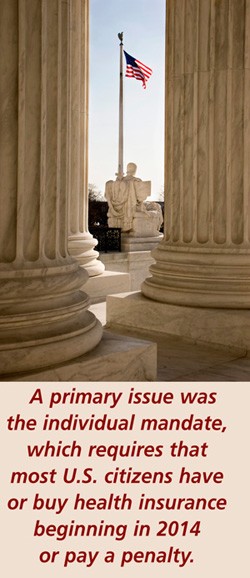 On June 28, 2012 — two years and two months after passage of the Patient Protection and Affordable Care Act (ACA) — the U.S. Supreme Court upheld the constitutionality of the law by a vote of five to four.1 Unless Congress takes further action, the provisions of the act currently in effect will remain so, and most others will become effective as planned in 2013 or 2014. As a consumer, taxpayer, and investor, you may want to consider the potential ramifications of this landmark decision.
On June 28, 2012 — two years and two months after passage of the Patient Protection and Affordable Care Act (ACA) — the U.S. Supreme Court upheld the constitutionality of the law by a vote of five to four.1 Unless Congress takes further action, the provisions of the act currently in effect will remain so, and most others will become effective as planned in 2013 or 2014. As a consumer, taxpayer, and investor, you may want to consider the potential ramifications of this landmark decision.
The Individual Mandate — Commerce or Tax?
A primary issue under consideration was the individual mandate, which requires that most U.S. citizens have or buy health insurance beginning in 2014 or pay a penalty. The government had argued that the mandate was within Congress’s power to regulate interstate commerce as well as its power to levy taxes.2
The court’s majority opinion, written by Chief Justice John Roberts, rejected the interstate commerce argument on the grounds that failing to buy health insurance is actually a lack of commerce and thus there is nothing to regulate. However, the majority upheld the individual mandate as a tax, pointing out that no one is forced to purchase health insurance under the law; rather, people can choose not to do so and instead pay a penalty (tax).3
The annual penalty is $95 per adult (up to $285 for a family) or 1% of adjusted gross income (AGI), whichever is greater, in 2014; $325 per adult (up to $975 for a family) or 2% of AGI in 2015; and $695 per adult (up to $2,085 for a family) or 2.5% of AGI in 2016. After 2016, there will be annual adjustments for inflation.
The Congressional Budget Office estimated that the law would extend health coverage to an additional 30 million Americans by 2016, leaving about 26 million without insurance.4 A private study suggested that about 7.3 million people would have to obtain unsubsidized coverage or pay the penalty.5
Benefits, Cost Controls, & Funding
The individual mandate is intended to provide insurance companies with a larger pool of consumers to help reduce individual costs.6 The ACA requires insurers to spend at least 80% of annual premiums on health care or activities that could help improve health-care quality.
Other key provisions:
- Individuals with pre-existing medical conditions cannot be rejected or charged higher premiums (currently in effect for children under 19; effective for adults starting in 2014).
- Lifetime benefit limits are prohibited for all new or reissued policies. Annual benefit limits will be prohibited beginning in 2014.
- Young adults up to age 26 can be covered under their parents’ policies.
- State-based insurance exchanges can offer coverage to individuals and small businesses with up to 100 employees beginning in 2014.
Other funding comes from fees and taxes on drug makers, health insurance providers, tanning salons, and certain medical devices.
Investment and Business Impact
After the court’s decision, insurance company stock prices fell and hospital stock prices rose.7 Although this is no guarantee of future performance, it probably reflects concern over the cap on insurance company earnings and the potential for more insured consumers of hospital services.
Starting in 2014, employers with 50 or more employees will face a penalty if they don’t offer employee health coverage. Businesses with 25 or fewer employees may be eligible for a tax credit based on the amount they contribute to employee health insurance premiums.
Expansion of States’ Rights
The Supreme Court struck down a provision that requires states to expand their Medicaid programs or lose all existing federal funding. States that choose to opt out of the expansion would lose only the additional federal funding earmarked for the expansion. The ruling, along with the limitation on federal control over interstate commerce, seems to strengthen the states’ autonomy in their relationship with the federal government. Ultimately, this decision could limit the expansion of Medicaid coverage to many low-income families.8
The fate of the Affordable Care Act may depend on the outcome of the 2012 elections, and the impact of the law might not come into focus until the individual mandate takes effect in 2014. It’s likely that the debate on health-care reform will continue.
The return and principal value of stocks fluctuate with changes in market conditions. Shares, when sold, may be worth more or less than their original cost.
1–3, 8) U.S. Supreme Court, 2012
4) Congressional Budget Office, 2012
5–6) Urban Institute, 2012
7) Yahoo! Finance, June 28, 2012
The information in this article is not intended as tax or legal advice, and it may not be relied on for the purpose of avoiding any federal tax penalties. You are encouraged to seek tax or legal advice from an independent Naperville tax advisor. The content is derived from sources believed to be accurate. Neither the information presented nor any opinion expressed constitutes a solicitation for the purchase or sale of any security. This material was written and prepared by Emerald. Copyright © 2012 Emerald Connect, Inc.












 On June 28, 2012 — two years and two months after passage of the
On June 28, 2012 — two years and two months after passage of the 